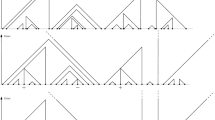Abstract:
We consider the following elementary model for clustering by ballistic aggregation in an expanding universe. At the initial time, there is a doubly infinite sequence of particles lying in a one-dimensional universe that is expanding at constant rate. We suppose that each particle p attracts points at a certain rate a(p)/2 depending only on p, and when two particles, say p and q, collide by the effect of attraction, they merge as a single particle p*q. The main purpose of this work is to point at the following remarkable property of Poisson clouds in these dynamics. Under certain technical conditions, if at the initial time the system is distributed according to a spatially stationary Poisson cloud with intensity μ 0 , then at any time t > 0, the system will again have a Poissonian distribution, now with intensity μ t , where the family solves a generalization of Smoluchowski's coagulation equation.
Similar content being viewed by others
Author information
Authors and Affiliations
Additional information
Received: 15 February 2002 / Accepted: 8 July 2002 Published online: 7 November 2002
Rights and permissions
About this article
Cite this article
Bertoin, J. Self-Attracting Poisson Clouds in an Expanding Universe. Commun. Math. Phys. 232, 59–81 (2002). https://doi.org/10.1007/s00220-002-0740-1
Issue Date:
DOI: https://doi.org/10.1007/s00220-002-0740-1




